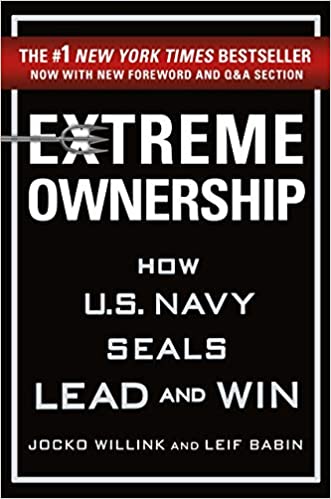
I recently read Extreme Ownership by Jacko Willink and Leif Babin, two former US Navy Seal Team leaders. While I could go into a complete summary of this fantastic book, I want to discuss a few concepts that stood out to me.
- Take Ownership of others’ mistakes.
- An Imperfect plan is better than no plan
- Admit failure
- Have High Standards
- Believe in the Why
- Keep it Simple
- Lead your boss as well as your team
Take Ownership of Other’s Mistakes — Extreme Ownership means taking responsibility for mistakes, not only your errors but the mistakes of others. If a team member makes a mistake, take Ownership of that mistake. Taking Ownership means taking responsibility and that there was more you could have done. Maybe, you should have provided more training, shared additional information, or done anything that would have kept them from making a mistake. This might seem extreme and impractical but think of your team’s response to you taking responsibility. They know that not only is it ok to make mistakes, but you have their back when they do. This is an incredible way to increase a team’s performance as it builds trust and cohesion.
An Imperfect Plan is better than no Plan — Doing something is better than doing nothing. Even if you do not have all the information, it is better to plan and execute it than wait for additional information to make the perfect plan. You see this a lot in business and personal life. People have a large project or change in their life, and they do not start towards the goal because they do not have it all figured out yet. It is better to start moving forward with an imperfect plan than stay stagnates waiting on the perfect plan.
Admit Failure — After reading this book, I started actively admitting when I was wrong. When I made a mistake, as we all do, I acknowledged it and informed all that was involved. Even if no one knew I had made a mistake yet, I would let them know I made a mistake and what it was. I realized that a good boss, co-worker, or partner does not care that you made a mistake; it happens. They care that you own up to it. Also, when you admit your mistakes, it is easier to correct them before they get blown out of proportion.
High Standards — This is for you and your team. The best teams have high standards; they exceed what is expected. Why do they do this? To be the best and succeed more, the higher your criteria, the easier it is to achieve your goals and grow.
Believe in the Why — to succeed in business or your personal life; you need to believe in the why. If you want to lose weight, think about why you want to lose weight, not that you want to weigh less. I want to lose weight and get in shape to run a 5K with my family, improve my health, and fit into my clothes; all of these are reasons why, but make sure you believe in the why if you do not believe in the why, it will be harder to keep going when things get tough—knowing the why keeps you focused on the mission and the reason you are doing what you are doing.
Keep it Simple — This is an essential rule for life, in my opinion. While looking good on paper, a complex plan is more challenging to execute than a simple one. It is harder to communicate with others and to grasp, especially as the method gets tested. There is a saying by Helmuth Von Moltke that states, “No plan survives contact with the enemy,” and that is true. The more complex the plan, the more difficult it is to execute.
Lead your Boss — When you lead your team, your boss is part of the team and needs to be led. Does that mean you tell them what to do? No, it means that everyone should be shown. You teach your boss by providing support and guidance to them just like you would a subordinate.
This book is an excellent look at how to lead in extreme situations. While many examples happen on the battlefield, these lessons are essential for everyone. Whether you are leading a team into battle or the conference room, the lessons in this book will help you.


